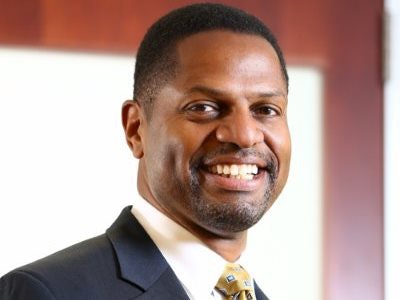 Karl Reid is executive director of the National Society of Black Engineers.
Karl Reid is executive director of the National Society of Black Engineers.Just as the country is seeing a big shift in the way we see information obtained and consumed, so, too, is higher education experiencing a shift.
That was the message a group of higher education leaders delivered at the 2015 Men and Women of Color Summit at Mississippi State University last week.
“The landscape of higher education is changing,” said Karl Reid, executive director of the National Society of Black Engineers. “I believe higher education is going through a paradigm shift and I believe the forces that are driving that are affordability … and technology.”
If rising and current leaders in the higher education space are going to best serve their students, they are going to have to recognize the shift and be ready to adapt.
“Higher ed hasn’t always been flexible or nimble,” said Dr. Regina Hyatt, the new vice president for student affairs at Mississippi State. “We’re used to doing things in a certain way and a certain pattern.
“We all are playing a little bit of catch-up in the higher ed space to learn how students process information.”
But the panelists said that has to change.
“You have to be flexible. The world and every single one of us in it requires flexibility,” Hyatt said.
First, said Mississippi Valley State University Vice President of Student Affairs Jacqueline Gibson, higher ed administrators need to understand the challenges facing today’s students.
“My students come to me with way, way, way more problems than we [had],” said Gibson, referencing the increased responsibilities and familial pressures on many of today’s students.
Not only that, but the psychological, mental and often academic deficiencies that students bring now are far greater than those of the students a generation ago, she says. Often getting students to the levels that will best support their success can be a challenge, Gibson continued.
Hyatt agreed.
“Understanding where and who our students are and having insight into what needs our students have coming into the higher education environment is really critical,” she said.
Some of those factors are environmental, said Gibson.
“Knowing the academic deficiencies of public education or [knowing] students’ education [experiences] may not be up to par when they arrive, which is no fault of their own,” is part of that comprehensive understanding of student needs, Gibson said.
Reid said that personal strategy is one thing HBCUs often get right.
“Out of the DNA of HBCUs is this ethic of care,” Reid said. “Institutions that are going to be successful have to be convinced that all students can be successful.”
It isn’t just mentorship of students that is critical, but mentorship of faculty and staff.
Hyatt said it is important to realize that “we often think of mentorship in a formal way, but mentorship also happens in very informal ways.”
Gibson agreed, saying that it is very important for higher education professionals, particularly those of color, to have someone they can turn to for advice, guidance, confidence building, networking opportunities and other support mechanisms.
Reid said that it is also critical that professionals are willing to embrace failure.
“Nothing teaches a lesson more than failure,” he said. “But it’s not just failure itself, but it’s the attitude about failure. Because if you’re afraid to fail, you’re not going to take risks.”
Not taking risks means remaining in the same ruts, with the same reticence to change that has characterized higher education for decades.
Hyatt agreed.
“Be willing to accept that you perhaps won’t have 100 percent buy-in [on every idea],” but if there’s a good enough majority of support, it is important to still “move forward with change,” said Hyatt.
“Every bit of leadership is about how we influence each other to be better than we are today,” she added.

![Mentor Mentee [60287]](https://img.diverseeducation.com/files/base/diverse/all/image/2024/04/Mentor_mentee__60287_.662959db8fddb.png?auto=format%2Ccompress&fit=crop&h=100&q=70&w=100)



















